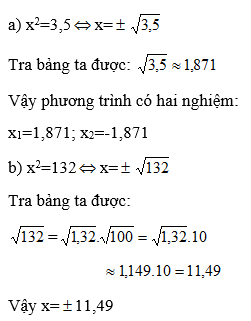Hãy nhập câu hỏi của bạn vào đây, nếu là tài khoản VIP, bạn sẽ được ưu tiên trả lời.

a) x 2 = 3 , 5 ⇔ x = ± √ 3 , 5
Tra bảng ta được: √3,5 ≈ 1,871
Vậy phương trình có hai nghiệm: x = ±1,871
x 1 = 1 , 871 ; x 2 = - 1 , 871
b) x 2 = 132 ⇔ x = ± √ 132 = ± √ 1 , 32 . √ 100 = ± 10 √ 1 , 32
Tra bảng ta được: √1,32 ≈ 1,149 nên
10√1,32 ≈ 10.1,149 ≈ 11,49
Vậy phương trình có hai nghiệm: x = ±11,49

x2 = 3,5 ⇔ x = ±√3,5
Tra bảng ta được: √3,5 ≈ 1,871
Vậy phương trình có hai nghiệm: x = ±1,871
x1= 1,871; x2 = -1,871

a) \(x^2=2\Rightarrow x=\sqrt{2}=1,414\)
b) \(x^2=3\Rightarrow x=\sqrt{3}=1,732\)
c) \(x^2=3,5\Rightarrow x=\sqrt{3,5}=1,871\)
d) \(x^2=4,12\Rightarrow x=\sqrt{4,12}=2,030\)

\(\Delta'=\left(a-1\right)^2-\left(a^2+a-2\right)=-3a+3\)
Để phương trình có hai nghiệm \(x_1;x_2\) thì \(\Delta'\ge0\Leftrightarrow-3a+3\ge0\Leftrightarrow a\le1\)
Áp dụng hệ thức Viet ta có: \(\hept{\begin{cases}x_1+x_2=2\left(a-1\right)\\x_1.x_2=a^2+a-2\end{cases}}\)
Vậy thì \(P=x_1^2+x_2^2=\left(x_1+x_2\right)^2-2x_1.x_2=4\left(a-1\right)^2-2\left(a^2+a-2\right)\)
\(=2a^2-10a+8=2\left(a^2-5a+\frac{25}{4}\right)-\frac{9}{2}=2\left(a-\frac{5}{2}\right)^2-\frac{9}{2}\ge-\frac{9}{2}\)
Vậy \(\text{min}P=-\frac{9}{2}\Leftrightarrow a=\frac{5}{2}.\)
Bài giải :
Δ'=(a−1)2−(a2+a−2)=−3a+3
Để phương trình có hai nghiệm x1;x2 thì Δ'≥0⇔−3a+3≥0⇔a≤1
Áp dụng hệ thức Viet ta có: {
| x1+x2=2(a−1) |
| x1.x2=a2+a−2 |
Vậy thì P=x12+x22=(x1+x2)2−2x1.x2=4(a−1)2−2(a2+a−2)
=2a2−10a+8=2(a2−5a+254 )−92 =2(a−52 )2−92
Với a≤1⇒P≥0
Vậy minP = 0 khi a = 1.

a = 1 , b = - ( 2m + 1 ) , c = m - 3
\(\Delta=b^2-4ac\)
\(=\left[-\left(2m+1\right)\right]^2-4.1.\left(m-3\right)\)
\(=4m^2+4m+1-4m+12\)
\(=4m^2+13>0\forall m\)
Vậy: Pt (1) luôn có 2 nghiệm phân biệt với mọi m
Theo Vi-et ta có: \(P=x_1x_2=\frac{c}{a}=m-3\)
\(A=3x_1x_2-2x_1x_2\ge4\)
\(A=3P-2P\ge4\)
\(A=P=m-3\ge4\Leftrightarrow m\ge7\)

a) Dùng hệ thức Viét ta có:
\(x_1x_2=\dfrac{-35}{1}=-35\\ \Leftrightarrow7x_2=-35\\ \Leftrightarrow x_2=-5\\ x_1+x_2=\dfrac{-m}{1}=-m\\ \Leftrightarrow7+\left(-5\right)=-m\\ \Leftrightarrow-m=2\\ \Leftrightarrow m=-2\)
b) Dùng hệ thức Viét ta có:
\(x_1+x_2=\dfrac{-\left(-13\right)}{1}=13\\ \Leftrightarrow12,5+x_2=13\\ \Leftrightarrow x_2=0,5\\ x_1x_2=\dfrac{m}{1}=m\\ \Leftrightarrow12,5\cdot0,5=m\\ \Leftrightarrow m=6,25\)
c) Dùng hệ thức Viét ta có:
\(x_1+x_2=\dfrac{-3}{4}\\ \Leftrightarrow-2+x_2=\dfrac{-3}{4}\\ \Leftrightarrow x_2=\dfrac{5}{4}\\ x_1x_2=\dfrac{-m^2+3m}{4}\\ \Leftrightarrow4x_1x_2=-m^2+3m\\ \Leftrightarrow4\cdot\left(-2\right)\cdot\dfrac{5}{4}+m^2-3m=0\\ \Leftrightarrow m^2-3m-10=0\\ \Leftrightarrow m^2-5m+2m-10=0\\ \Leftrightarrow m\left(m-5\right)+2\left(m-5\right)=0\\ \Leftrightarrow\left(m+2\right)\left(m-5\right)=0\\ \Leftrightarrow\left[{}\begin{matrix}m=-2\\m=5\end{matrix}\right.\)
d) Dùng hệ thức Viét ta có:
\(x_1x_2=\dfrac{5}{3}\\ \Leftrightarrow\dfrac{1}{3}x_2=\dfrac{5}{3}\\ \Leftrightarrow x_2=5\\ x_1+x_2=\dfrac{-\left[-2\left(m-3\right)\right]}{3}=\dfrac{2\left(m-3\right)}{3}=\dfrac{2m-6}{3}\\ \Leftrightarrow3\left(x_1+x_2\right)=2m-6\\ \Leftrightarrow3\left(\dfrac{1}{3}+5\right)=2m-6\\ \Leftrightarrow3\cdot\dfrac{16}{3}+6=2m\\ \Leftrightarrow16+6=2m\\ \Leftrightarrow22=2m\\ \Leftrightarrow m=11\)

a)

b) \(\dfrac{1}{2}x^2-2x+1=0\Leftrightarrow x^2-4x+2=0\)
\(\Leftrightarrow x_1=2-\sqrt{2}\approx0,59\) \(x_2=2+\sqrt{2}\approx3,41\)

x2 = 132 ⇔ x = ±√132 = ±√1,32.√100 = ±10√1,32
Tra bảng ta được: √1,32 ≈ 1,149 nên
10√1,32 ≈ 10.1,149 ≈ 11,49
Vậy phương trình có hai nghiệm: x = ±11,49